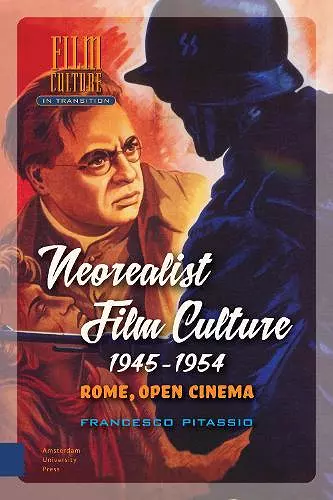Neorealist Film Culture, 1945-1954
Rome, Open Cinema
Format:Hardback
Publisher:Amsterdam University Press
Published:9th Dec '19
Should be back in stock very soon

Unique, truthful, brutal... Neorealism is often associated with adjectives stressing its peculiarities in representing the real, its lack of antecedents, and its legacy in terms of film style. While this is useful when confronting auteurs such as De Sica, Rossellini or Visconti, it becomes problematic when examining a widespread cultural practice that realistic modes deeply affected. This cultural production included filmmaking, literature, visual culture and photography, as well as media discourses. It was internally contradictory but fruitful inasmuch as its legacy influenced national culture for many decades to come. The volume spotlights post-war Italian film culture by locating a series of crossroads, i.e. topics barely examined when discussing neorealism: nation, memory and trauma, visual culture, stardom, and performance. The aim is to deconstruct neorealism as a monument and to open up its cultural history.
"If you think you know everything there is to know (or wish to know) about neo-realism, prepare to be surprised. The latest book by Francesco Pitassio, professor of film studies at the University of Udine, will do just that. [...] Published with great editorial care, this beautifully illustrated volume, featuring 31 images in black and white and nine in colour, is an exceptional achievement. [...] Remarkably rich with references to debates and other scholars’ insights, Pitassio’s dense book has the merit of allowing multiple points of entry. Detailed and complex when it needs to be, it frequently summarizes its own argument and provides synoptic chapter abstracts and conclusions that help the reader absorb the wealth of references and discussions. Some books tend to settle debates once for all, and in the process become dead ends. Pitassio’s Neorealist Film Culture opens countless venues for engagement and future research. It will do this for years to come."
- Giorgio Bertellini, Journal of Italian Cinema & Media Studies, Volume 10 Number 1 (2022)
"An extremely original and fascinating account, a substantial advancement into this field, a labyrinthic exploration of an expanded and exploded universe."
- Andrea Mariani, Universit a degli Studi di Udine, Italy, Historical Journal of Film, Radio and Television, Vol. 41, No. 3 (2021)
"Riding this exciting new wave in cultural historiography, Leavitt and Pitassio’s books on Italian neorealism set an important standard for historical research within film studies. They should be compulsory reading for emerging scholars in search of innovative approaches to film studies worldwide."
- Luca Caminati (Concordia University), Canadian Journal of Film Studies 2021 (joint review)
"Pitassio shows how the traumatic national past is engaged in films [...] several of which were made by directors who were very compromised with the Fascist regime, thus demonstrating the complex entanglements of the post-war period. Particularly striking is his reading of male disabled bodies as metaphors for national trauma in a range of contemporary documentaries. Pitassio thus adds important nuance to discussions of Italy’s failure to account for its Fascist past, and the central role within that of damaged masculinity as a trope."
- Catherine O'Rawe, Bristol University, Modern Language Review 116, 4 (2021)
"Is there in fact yet more that could be said about neorealism? The sensationalist publicity materials that Pitassio discusses in Chapter 3 indicate how the question of feeling is so little understood in relation to neorealist film culture, being too often marginalized, despite its fundamental importance to how national identity or collective memory are constructed, let alone its relevance to filmgoing and the popular audience. From this should arise further developments of film’s role in relation to culture, history and subjectivity. These suggestions all indicate the potential for continued discussion of the neorealist moment in cinema, an enterprise in which this volume is assured of its place."
- Louis Bayman, Screen, Volume 61, Issue 3, Autumn 2020
"Francesco Pitassio's Neorealist Film Culture, 1945-1954 constitutes an extremely valuable contribution that promises to enliven the debate on neorealism well beyond Italian film studies. The importance of this work is in reshaping many of these debates and their relevance to transnational cinema studies."
- Giuseppe Fidotta, Transnational Screens (2020)
"One can be sure that the outstanding qualities of this book will soon turn it into a real classic, both in the specific domain of Neorealist cinema and in the broader domain of film and cultural studies in general."
- Jan Baetens, Cultural Studies Leuven (2020)
ISBN: 9789089648006
Dimensions: unknown
Weight: unknown
384 pages